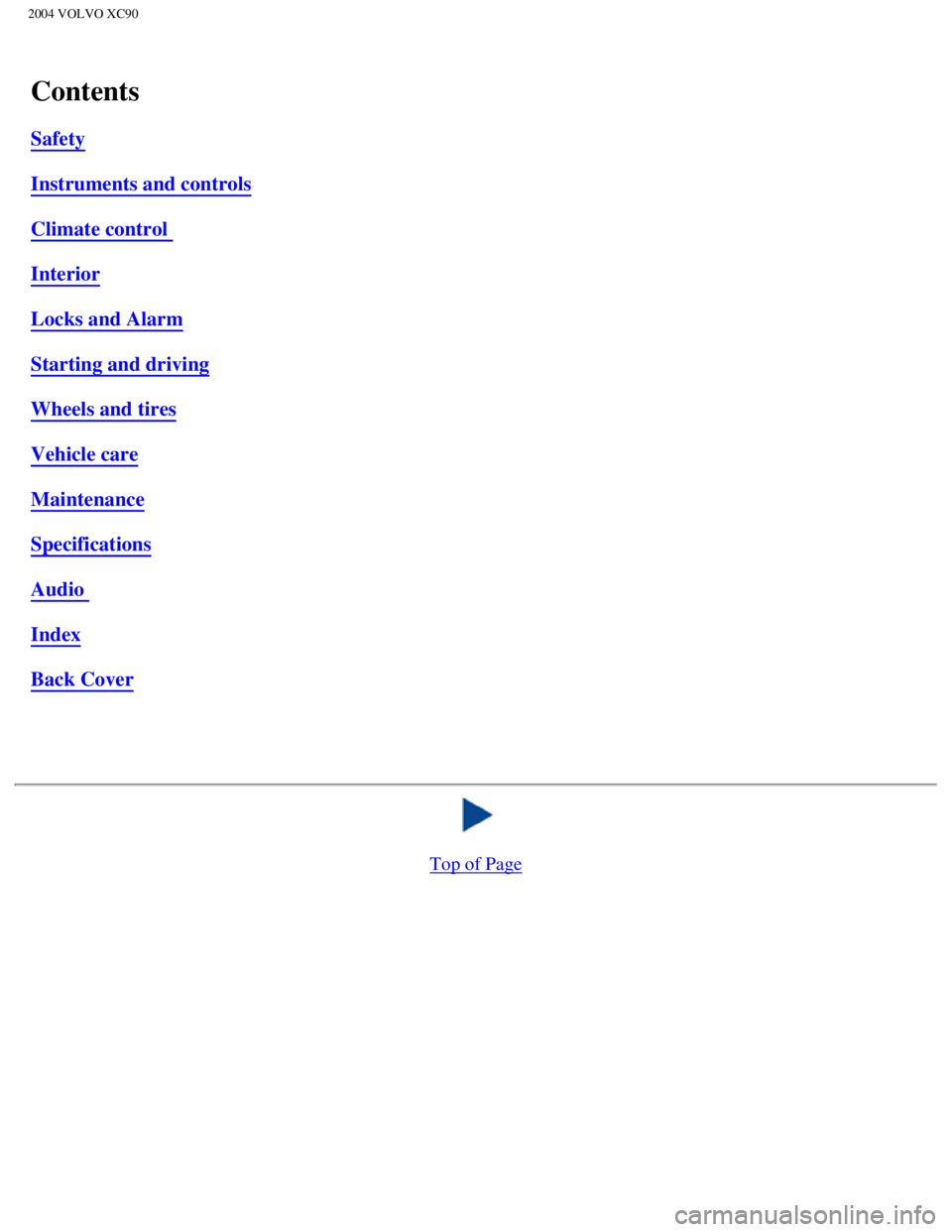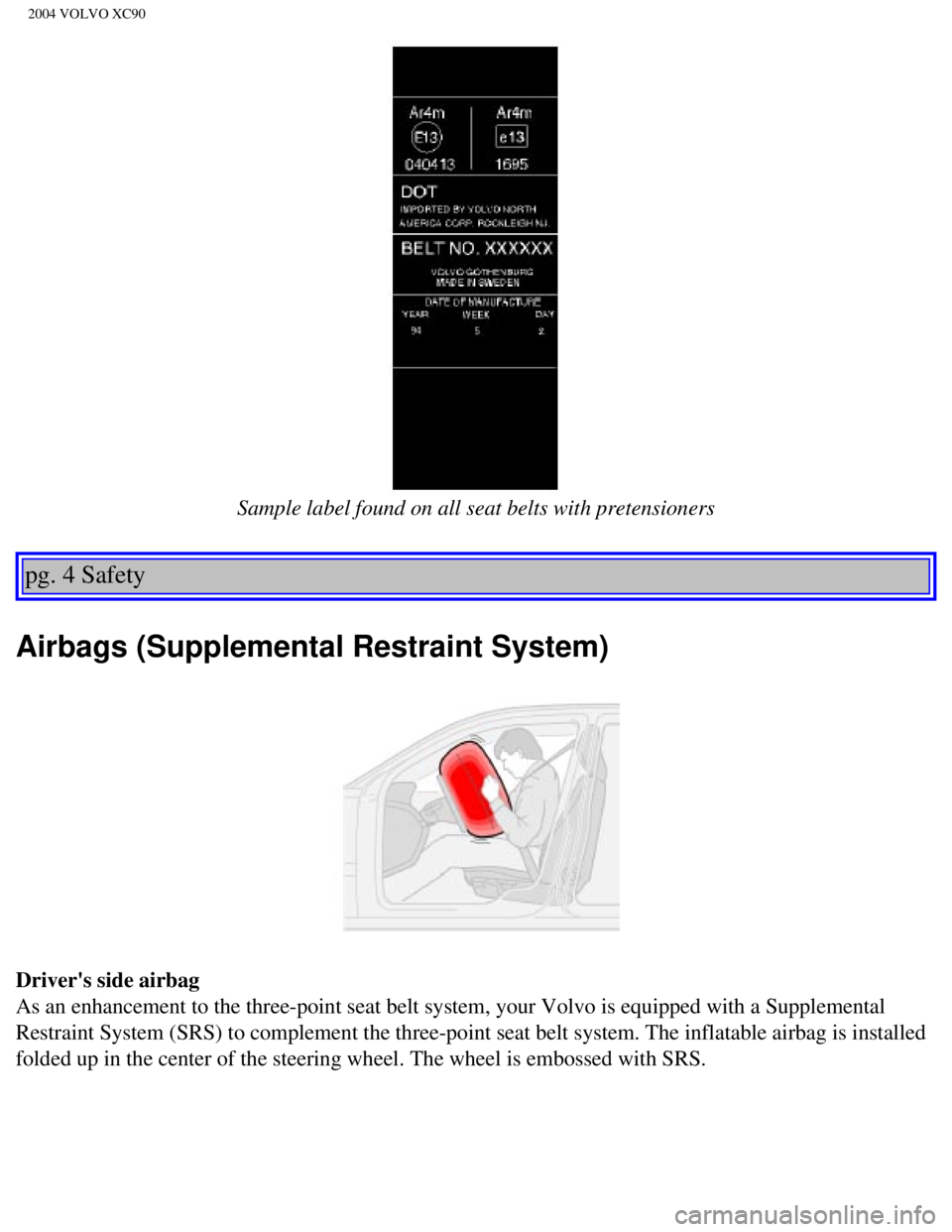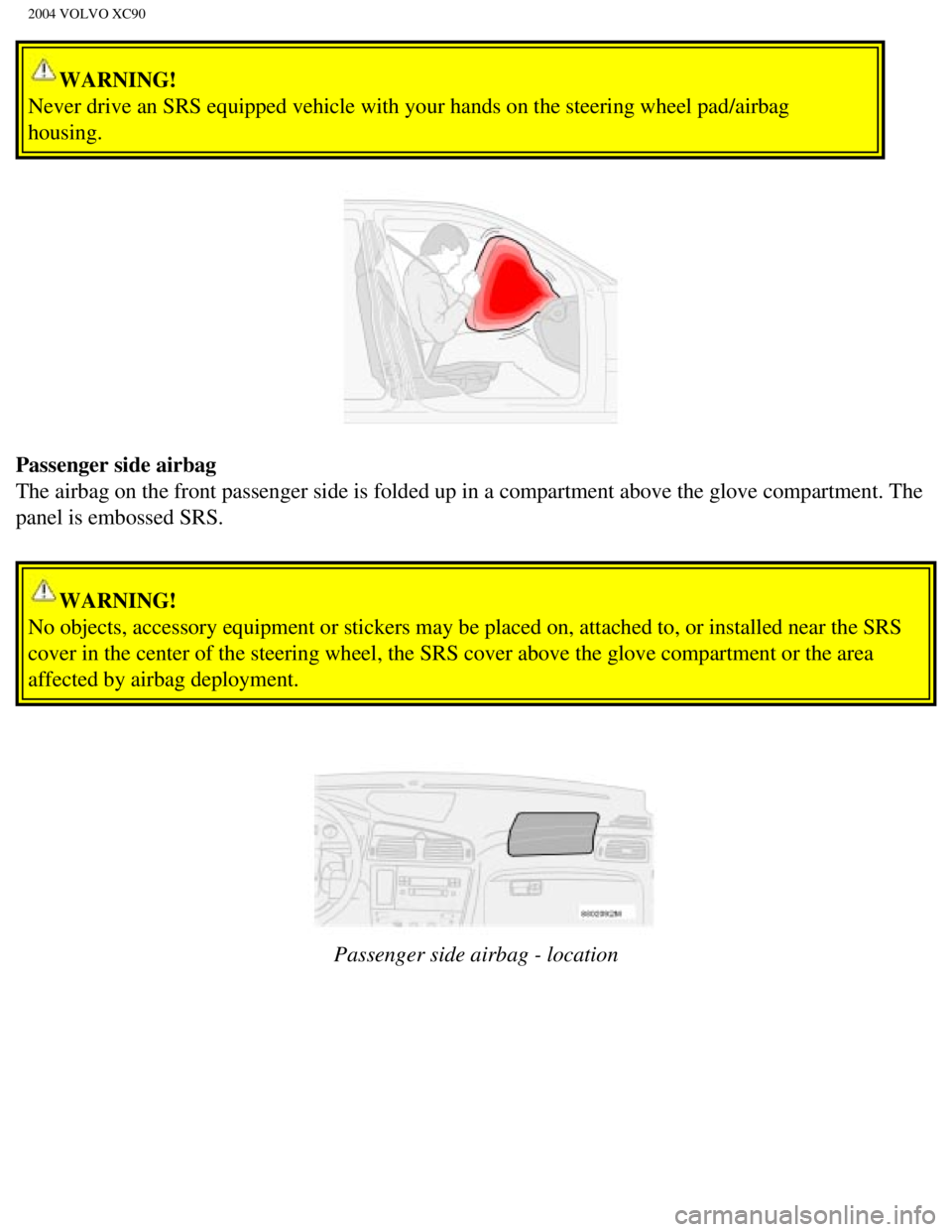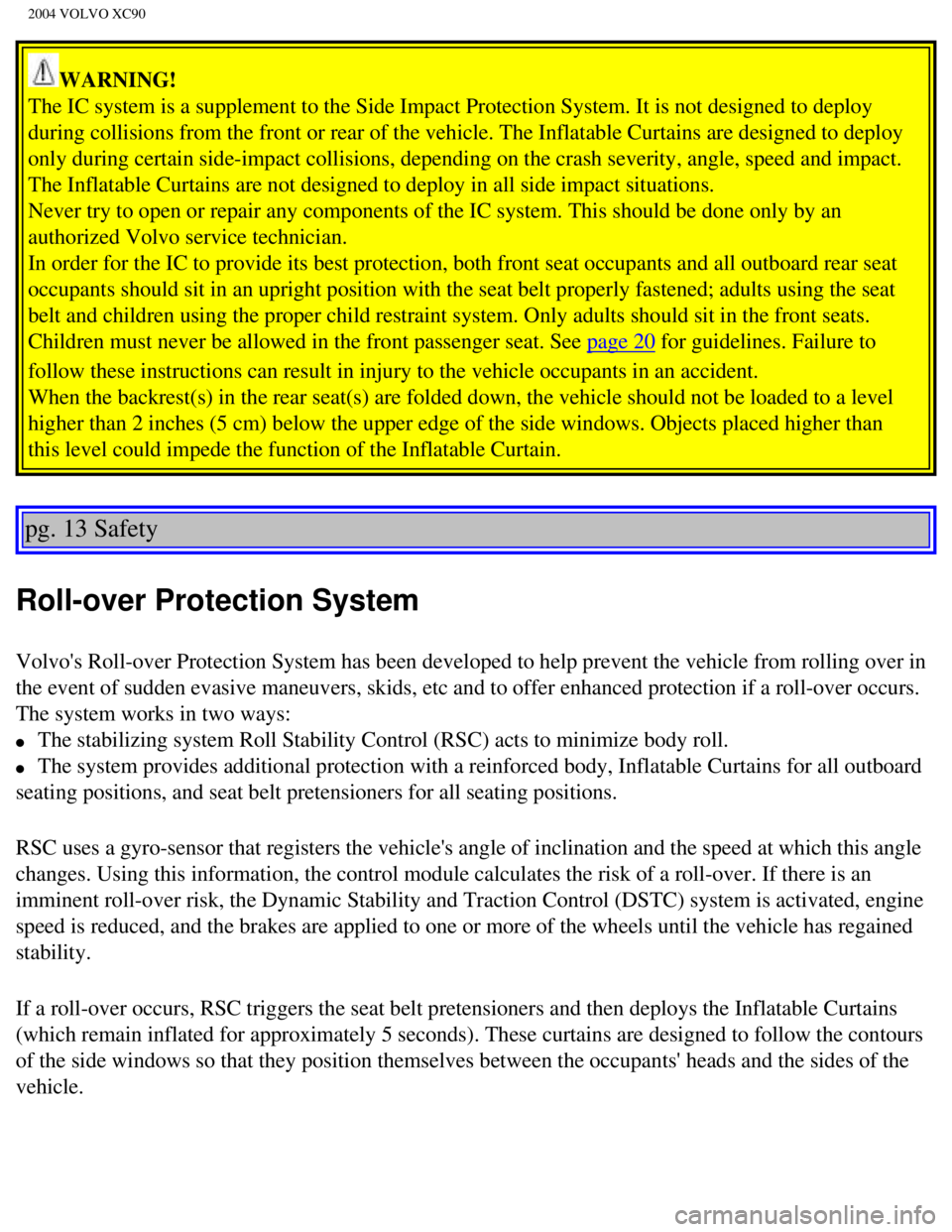2004 VOLVO XC90 wheel
[x] Cancel search: wheelPage 2 of 245

2004 VOLVO XC90
instructions and maintenance requirements/recommendations in this manual\
. We also urge you and your
passengers to wear seat belts at all times in this (or any other) auto\
mobile. And, of course, please do not operate
a vehicle if you may be affected by alcohol, medication or any impairmen\
t that could hinder your ability to
drive.
Your Volvo is designed to meet all applicable safety and emission standa\
rds, as evidenced by the certification
labels attached to the driver's door opening and on the left wheel housi\
ng in the engine compartment.
For further information please contact your retailer, or:
In the USA:
Volvo Cars of North America
Customer Relations
P.O. Box 914
Rockleigh, New Jersey 07647-0914
800-458-1552
In Canada:
Volvo Cars of Canada Ltd.
175 Gordon Baker Road
North York, Ontario M2H 2N7
800-663-8255
General information
Shiftlock (automatic transmission)
When your car is parked, the gear selector is locked in the (P)ark position. To release the selector from this
position, turn the ignition key to position II (or start the engine), \
depress the brake pedal, press the button on the
front side of the gear selector knob and move the selector from (P)ark\
.
Keylock (automatic transmission)
When you switch off the ignition, the gear selector must be in the (P)ark position before the key can be
removed from the ignition switch.
Anti-lock Brake System (ABS)
The ABS system in your car performs a self-diagnostic test when the vehi\
cle first reaches the speed of
approximately 12 mph (20 km/h). The brake pedal will pulsate several t\
imes and a sound may be audible from
the ABS control module. This is normal.
Fuel filler door
The fuel filler door, located on the right rear fender, is connected to \
your vehicle's central locking system.
Press the button on the light switch panel (see
page 30) when the car is at a standstill to unlock the fuel filler
door. Please note that the fuel filler door will remain unlocked until t\
he car begins to move forward. An audible
click will be heard when the fuel filler door relocks.
Fuel filler cap
file:///K|/ownersdocs/2004/2004_XC90/04xc90_00.htm (2 of 7)12/30/2006 \
4:35:10 PM
Page 6 of 245

2004 VOLVO XC90
5. Temperature gauge 24
6. Odometer/Trip odometer/Cruise control indicator 24, 37
7. Speedometer iv
8. Turn signal indicator lights 24
9. Tachometer 24
10. Ambient temperature gauge, clock, gear indicator 24
11. Fuel gauge 24
12. Indicator and warning symbols 25
13. Panel vents 47
14. Glove compartment 65
15. Hazard warning flashers 35
16. Audio system 159
17. Switches in the center console 29
18. Climate system controls 48
19. Windshield wiper/washer lever 33
20. Audio control buttons in steering wheel 161
21. Instrument panel 24
22. Horn iv
23. Cruise control buttons in steering wheel 37
24. Turn signals, High/low beams 32
25. Front fog lights, Rear fog light 30
26. Parking brake pedal 38
27. Parking brake release handle 38
28. Button for unlocking fuel filler door 30
29. Reading lights 61
30. Courtesy light 61
31. Moonroof control (option) 43
32. Seat belt reminder 27
33. Rearview mirror 42
34. Central locking button 75
35. Lockout switch for rear seat power windows 41
36. Power window controls 40
37. Sideview mirror controls 42
WARNING!
If your vehicle is involved in an accident, unseen damage may affect you\
r vehicle's driveability and
safety.
Contents
file:///K|/ownersdocs/2004/2004_XC90/04xc90_00.htm (6 of 7)12/30/2006 \
4:35:10 PM
Page 7 of 245

2004 VOLVO XC90
Contents
Safety
Instruments and controls
Climate control
Interior
Locks and Alarm
Starting and driving
Wheels and tires
Vehicle care
Maintenance
Specifications
Audio
Index
Back Cover
Top of Page
file:///K|/ownersdocs/2004/2004_XC90/04xc90_00.htm (7 of 7)12/30/2006 \
4:35:10 PM
Page 11 of 245

2004 VOLVO XC90
Sample label found on all seat belts with pretensioners
pg. 4 Safety
Airbags (Supplemental Restraint System)
Driver's side airbag
As an enhancement to the three-point seat belt system, your Volvo is equ\
ipped with a Supplemental
Restraint System (SRS) to complement the three-point seat belt system.\
The inflatable airbag is installed
folded up in the center of the steering wheel. The wheel is embossed wit\
h SRS.
file:///K|/ownersdocs/2004/2004_XC90/04xc90_01a.htm (4 of 12)12/30/200\
6 4:35:11 PM
Page 12 of 245

2004 VOLVO XC90
WARNING!
Never drive an SRS equipped vehicle with your hands on the steering whee\
l pad/airbag
housing.
Passenger side airbag
The airbag on the front passenger side is folded up in a compartment abo\
ve the glove compartment. The
panel is embossed SRS.
WARNING!
No objects, accessory equipment or stickers may be placed on, attached t\
o, or installed near the SRS
cover in the center of the steering wheel, the SRS cover above the glove\
compartment or the area
affected by airbag deployment.
Passenger side airbag - location
file:///K|/ownersdocs/2004/2004_XC90/04xc90_01a.htm (5 of 12)12/30/200\
6 4:35:11 PM
Page 15 of 245

2004 VOLVO XC90
WARNING!
Children must never be allowed in the front passenger's seat. Volvo reco\
mmends that ALL occupants
(adults and children) shorter than 4 feet 7 inches (140 cm) be seate\
d in the back seat of any vehicle
with a front passenger-side airbag. See
page 20 for guidelines.
Occupants in the front passenger's seat must never sit on the edge of th\
e seat, sit leaning toward the
instrument panel or otherwise sit out of position. The occupant's back m\
ust be as upright as comfort
allows and be against the seat back with the seat belt properly fastened\
.
Feet must be on the floor, e.g. not on the dash, seat or out of the wind\
ow.
No objects or accessory equipment, e.g. dashboard covers, may be placed \
on, attached to, or installed
near the SRS hatch (the area above the glove compartment) or the area \
affected by airbag deployment
(see illustration on
page 4).
There should be no loose articles, e.g. coffee cups, on the floor, seat \
or dashboard area.
Never try to open the SRS cover on the steering wheel or the passenger s\
ide dash. This should only be
done by an authorized Volvo service technician.
Failure to follow these instructions can result in injury to the vehicle\
occupants.
Warning light in the instrument panel
A self-diagnostic system incorporated in the sensor monitors the SRS. Th\
is system does not, however,
monitor the Side Impact Protection System (SIPS) airbags. If a fault i\
s detected, the warning light will
illuminate. The light is included in the warning/indicator light cluster\
in the instrument panel. Normally,
the SRS warning lamp should light up when the ignition key is turned to \
positions I, II or III and should
go out after 7 seconds or when the engine is started. Check that this li\
ght is functioning properly every
time the vehicle is started.
The following items are monitored by the self-diagnostic system:
l Sensor unit
l Cable harness
l Gas generator
file:///K|/ownersdocs/2004/2004_XC90/04xc90_01a.htm (8 of 12)12/30/200\
6 4:35:11 PM
Page 18 of 245

2004 VOLVO XC90
Front airbag (SRS) system
As an enhancement to the three-point seat belt system, your Volvo is equ\
ipped with a Supplemental
Restraint System (SRS). The Volvo SRS consists of an airbag (2) on b\
oth the driver's and passenger's
sides and seat belt pretensioners in both front door pillars. The system\
is designed to supplement the
protection provided by the three-point seat belt system. All rear seat b\
elts are also equipped with
pretensioners.
The SRS system is indicated by the "SRS" embossed on the steering wheel \
pad and above the glove
compartment, and by decals on both sun visors and on the front and far r\
ight side of the dash.
The airbags are folded and located in the steering wheel hub and above t\
he glove compartment.
Deployment:
The SRS airbags are designed to deploy during certain frontal or front-a\
ngular collisions, impacts, or
decelerations, depending on the crash severity, angle, speed and object \
impacted. The airbags may also
deploy in certain non-frontal collisions where rapid deceleration occurs\
.
The airbag system includes gas generators (1) surrounded by the airbag\
s (2) and front seat belt
pretensioners for both of the front seats. To deploy the system, the sen\
sor (3) activates the gas generators
causing the airbags to be inflated with nitrogen gas.
As the movement of the seats' occupants compresses the airbags, some of \
the gas is expelled at a
controlled rate to provide better cushioning. Both seat belt pretensione\
rs also deploy, minimizing any
seat belt slack.The entire process, including inflation and deflation of\
the airbags, takes approximately
two-tenths of a second.
file:///K|/ownersdocs/2004/2004_XC90/04xc90_01a.htm (11 of 12)12/30/20\
06 4:35:11 PM
Page 23 of 245

2004 VOLVO XC90
WARNING!
The IC system is a supplement to the Side Impact Protection System. It i\
s not designed to deploy
during collisions from the front or rear of the vehicle. The Inflatable \
Curtains are designed to deploy
only during certain side-impact collisions, depending on the crash sever\
ity, angle, speed and impact.
The Inflatable Curtains are not designed to deploy in all side impact si\
tuations.
Never try to open or repair any components of the IC system. This should\
be done only by an
authorized Volvo service technician.
In order for the IC to provide its best protection, both front seat occu\
pants and all outboard rear seat
occupants should sit in an upright position with the seat belt properly \
fastened; adults using the seat
belt and children using the proper child restraint system. Only adults s\
hould sit in the front seats.
Children must never be allowed in the front passenger seat. See
page 20 for guidelines. Failure to
follow these instructions can result in injury to the vehicle occupants \
in an accident.
When the backrest(s) in the rear seat(s) are folded down, the vehicl\
e should not be loaded to a level
higher than 2 inches (5 cm) below the upper edge of the side windows. \
Objects placed higher than
this level could impede the function of the Inflatable Curtain.
pg. 13 Safety
Roll-over Protection System
Volvo's Roll-over Protection System has been developed to help prevent t\
he vehicle from rolling over in
the event of sudden evasive maneuvers, skids, etc and to offer enhanced \
protection if a roll-over occurs.
The system works in two ways:
l The stabilizing system Roll Stability Control (RSC) acts to minimize b\
ody roll.
l The system provides additional protection with a reinforced body, Inflat\
able Curtains for all outboard
seating positions, and seat belt pretensioners for all seating positions\
.
RSC uses a gyro-sensor that registers the vehicle's angle of inclination\
and the speed at which this angle
changes. Using this information, the control module calculates the risk \
of a roll-over. If there is an
imminent roll-over risk, the Dynamic Stability and Traction Control (DS\
TC) system is activated, engine
speed is reduced, and the brakes are applied to one or more of the wheel\
s until the vehicle has regained
stability.
If a roll-over occurs, RSC triggers the seat belt pretensioners and then\
deploys the Inflatable Curtains
(which remain inflated for approximately 5 seconds). These curtains ar\
e designed to follow the contours
of the side windows so that they position themselves between the occupan\
ts' heads and the sides of the
vehicle.
file:///K|/ownersdocs/2004/2004_XC90/04xc90_01b.htm (4 of 16)12/30/200\
6 4:35:12 PM